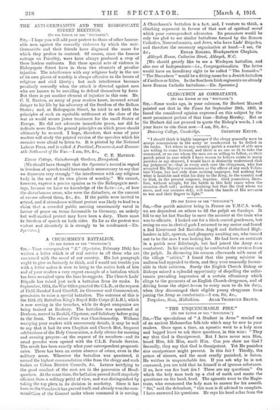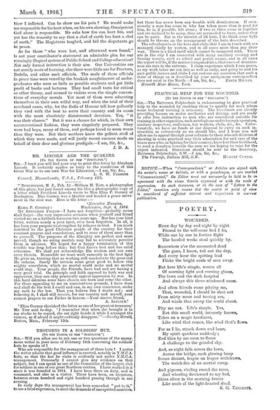"1.11E UNQUENCHABLE FIRE."
[TO THE EDITOR OF TEE "SPECTATOR."] Sgt,—The speculations of " A Student in Arms " remind me of an ancient Mahomedan folk-tale which may be new to your readers. Once upon a time, an agnostic went to a holy man and begged leave to ask three questions, in this wise : " They say that God is Omnipresent. But I have never seen Him, heard Him, felt Him, smelt Him. Can you show me God Secondly, they say that God is Omnipotent. Yet He punishes sins omnipotence might prevent. Is this fair Y Thirdly, the prince of sinners, and the most cruelly punished, is Satan. He writhes in unquenchable fire. If you ask why he is not consumed, you are told that he himself is of igneous substance. If so, how can fire hurt fire Y These are my questions." On which the holy man took up a clod of earth and smote the questioner on the head, hard. The agnostic went to the Magis- trate, who summoned the holy man to answer for his assault. " Sir," said the defendant, " this man is ill advised to complain. I have answered his questions. He says his head aches from the blow I inflicted. Can he show me his pain ? He would make me responsible for his hurt when, on his own showing, Omnipotent God alone is responsible. He asks how fire can hurt fire, and yet has the temerity to say that a clod of earth has hurt a clod of earth." The Magistrate laughed, and bid the disputants go in peace.
As for those " who were lost, and afterward wore found," is not your contributor's statement an admirable plea for our seemingly illogical system of Public School and College education? Not only formal instruction is their aim. Our Universities are not merely seats of learning, else there were little use for Proctors, Bedells, and other such officials. The souls of these officials in peace time were vexed by the freakish naughtinesses of under- graduates who were as little as possible students and got little profit of books and lectures. They had small taste for ethical or other theory, and seemed to violate even the simple conven- tions of everyday morals. Yet most of them were educating themselves in their own wilful way, and when the trial of their manhood came, why, let the Rolls of Honour tell how gallantly they vied with the best to serve their country and its cause with the most absolutely disinterested devotion. Yos, " it was their chance." But it was a chance for which, in their own unconventional fashion, they were singularly prepared. They were bad boys, many of them, and perhaps loved to seem worse than they were. But their mothers knew the gallant stuff of which they were made, and will justly resent excuses made on behalf of their dear and glorious prodigals.—I am, Sir, &c.,
J. D. A.



































 Previous page
Previous page